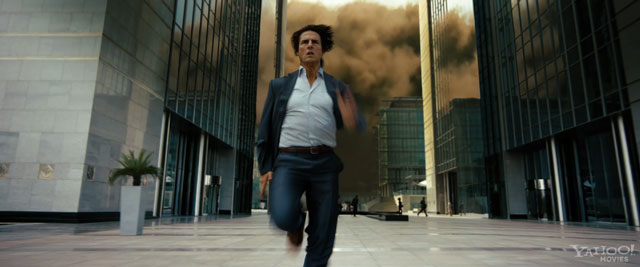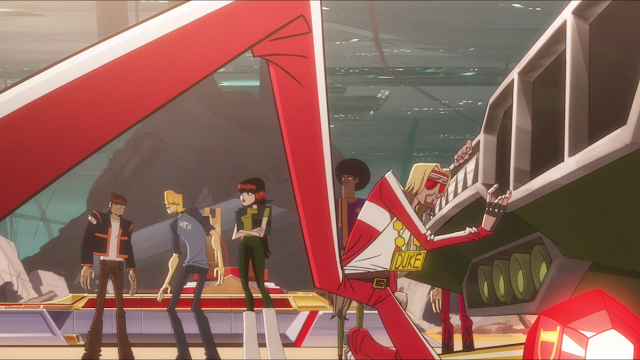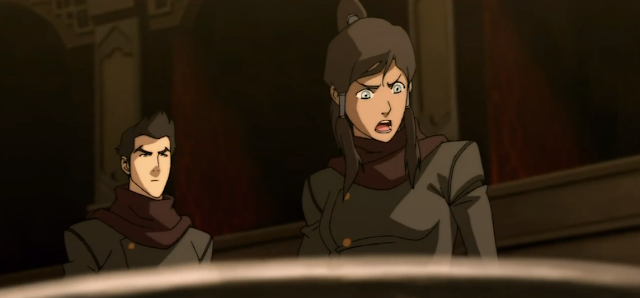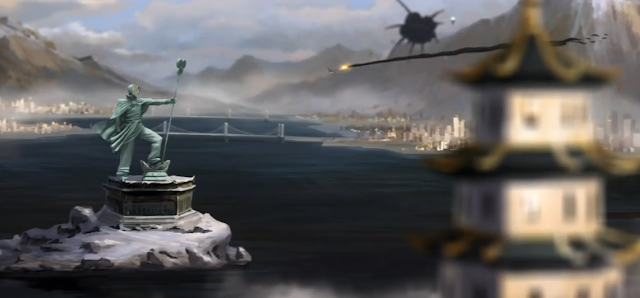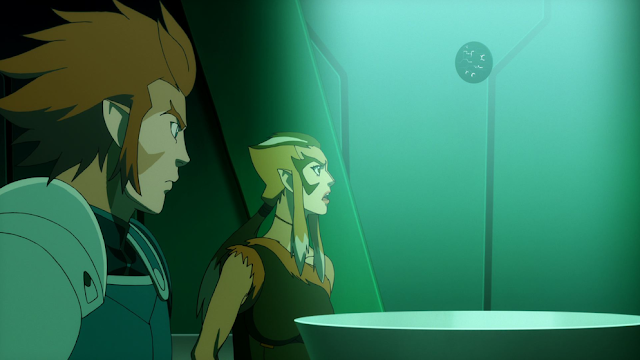Each Tuesday in "5-Piece Cartoon Dinner," I dine on five of the week's most noteworthy animated cable shows that are found outside my Adult Swim comfort zone.
In previous weeks, I've covered Cartoon Network's
Green Lantern: The Animated Series, which just quietly ended its first season. The same week as the season finale, Green Lantern became the talk of the non-comics media and trended on Twitter because DC announced that it's reintroducing one of the Green Lanterns, the previously straight Alan Scott, as openly gay.
While I'm happy for GLBT comics readers because the not-diverse-enough world of superhero comics just got a skosh more diverse, DC and Marvel still have a lot more work to do in terms of diversity. And as
Grantland's Alex Pappademas said, maybe DC is making too big of a deal over this. It's second-tier Green Lantern Alan Scott, who hasn't been a major DC character since the '50s, and he's
not the first-ever gay superhero.
Topless Robot editor Rob Bricken
called shenanigans on DC's announcement about its "major new iconic gay character," which he found to be exploitative. "Alan Scott is not that iconic. In fact, I don't think any non-comics fans even know who the fuck he is," grumbled the always squeaky-clean-sounding Bricken on his blog. "He's not even going to be part of the main DC universe. At least Marvel has Northstar's wedding taking place in the normal Marvel U."
DC's outing of Alan led to lots of quips on Twitter like "Can the Green Lantern please come and organize my closet and tell me which jeans I look fat in?" (
Molly Ringwald) and "Hope the first issue of the gay Green Lantern comic has him dishing lots of catty remarks about the Green Lantern movie" (awesomely anti-conservative ex-
MST3K joke writer
Frank Conniff). I was going to tweet an ultra-nerdy quip like "DC's rebooted Green Lantern Alan is now gay. So when he goes on & on about Will, he means some fabulous dude he met at the gym."
But I wasn't in the mood to have my tweet appear in Twitter searches for "Green Lantern" alongside lame and hateful tweets from conservatives like "Thanks to our depraved society, the Green Lantern will now be known as the Pink Nightlight" from a
"Pastor Greg Locke." If that's your idea of humor, stick to announcing bingo numbers, pastor.
While all this is going on, the "DC Nation" block is re-airing the entire first season of
GL:TAS, starting with the "Beware My Power" premiere episode. I hadn't watched that installment since last year, so I forgot that during "Beware My Power," Hal Jordan, whom
I referred to as a Rey Curtis-y space cop (a.k.a. bland and sanctimonious), was a little less Rey Curtis-y than I thought and willing to defy authority, particularly his fuddy-duddy Guardian superiors when they get too fuddy-duddy. The series opens with Hal fresh out of boot camp (his drill sergeant-turned-partner Kilowog frequently kids him about how he's such a naive
poozer) and still adjusting to Green Lantern Corps procedure, a more interesting way to write Hal than having him easily get the hang of being a Lantern like in the live-action Ryan Reynolds flop.
I always liked how
GL:TAS skipped the origin story--the least interesting kind of story in the superhero genre--and cut to the chase in "Beware My Power." It's something a lot more live-action superhero movies ought to do, and I'm glad Joss Whedon's
The Avengers does what
GL:TAS did and basically says, "Hey, origin story structure, fuck off into the night."
***
Jeffrey Combs, whose voice work I praised while
briefly discussing his regular role on the currently-on-hiatus
Transformers Prime, is unsurprisingly terrific during his guest shot as the tragic title character of "The Soul Sever," the last episode of Cartoon Network's
ThunderCats reboot before its two-part season (or series) finale. I appreciate how the new
ThunderCats is better animated and more sophisticated than the cheesy '80s Rankin-Bass version. But I'm neither a sword-and-sorcery guy nor a furry, so other than the two-part "Omens" premiere and an episode about rapidly aging woodland creatures that looked like a Studio Ghibli remake of the
Doctor Who story "The Girl in the Fireplace," I haven't been watching
ThunderCats, which is apparently
on the bubble.
One change that makes this new version superior to the original is the reworking of lead hero Lion-O (former
Batman Beyond star Will Friedle) into an insecure and hotheaded teen adjusting to his role as leader, a far cry from the totally confident preteen-in-a-man's-body who brings to mind Shazam, the DC Property Formerly Known as Captain Marvel. On the original show, Lion-O was a grown-up with a 12-year-old boy's mind because he spent all of his teens in suspended animation on a spaceship that fled from the planet Thundera to Third Earth.
The reimagining dispenses with Lion-O's strange origin and makes the character more relatable. He's also angstier. The series opened with Mumm-Ra (Robin Atkin Downes) murdering Lion-O's father and king Claudus (who, in a nice way of passing the baton, was played by Larry Kenney, the voice of Lion-O on the '80s show, as well as the father of
State and
Reno 911! alum Kerri Kenney-Silver). Mumm-Ra and his minions used advanced technology to destroy Thundera (now just a kingdom on Third Earth instead of another planet) and forced the Thunderian survivors into exile or, in the case of those who weren't as lucky as the escaped ThunderCats, slavery.
So Lion-O hates technology because of its role in obliterating his homeland. In "The Soul Sever," the Luddite becomes less resentful of technology and realizes it's "neither the disease nor the cure" as he attempts to recover the magical Book of Omens, which guides the ThunderCats on their mission to defeat Mumm-Ra and was stolen from them by Combs' mad scientist character, the show's shout-out to the actor's signature role in
Re-Animator.
The Soul Sever is a robot scientist who once was flesh. An alien whose wife and children died from a plague, he made a Faustian bargain to resurrect them by allowing a Cybermen-like race known as the Necromechers to rebuild him as one of their own, with the hopes that the technology they utilized to make him immortal would do the same for this family. But when the Necromechers refused to grant the Soul Sever access to their tech because they thought his plans would have Frankenstein-ian consequences, the Soul Sever wiped out the Necromechers. After stealing their tech, the Soul Sever was able to recover his loved ones' floating souls but has been unsuccessful in putting their souls into robot bodies.
When he learns the Book of Omens carries the soul of
Obi-Wan Jaga (Corey Burton), the Soul Sever believes the artifact can bring his family back to corporeal form. Lion-O, Panthro (Kevin Michael Richardson) and Tygra (Matthew Mercer), Lion-O's adopted older brother, end up as the scientist's unwilling guinea pigs for his flesh-to-metal experiment. With the help of a chittering mechanical bug sidekick named Flicker, Lion-O and Panthro are able to break out of their restraints. But they're too late to pull out Tygra, whose soul is transferred by the Soul Sever's Book of Omens-powered experiment into an out-of-control mecha monstrosity that, in a wild sequence reminiscent of Tetsuo's grisly climactic transformation in
Akira, keeps growing and growing due to spare parts it affixes to its body.
The mad scientist, who realizes the folly of his actions, must sacrifice his loved ones' souls to save himself, Lion-O and Panthro from Mecha Tygra and transfer Tygra's soul back to his normal body. It's rare to see kids' animation on TV tackle a downbeat ending like the one for the Soul Sever, his family and Flicker, which gives its life to activate the power surge that destroys Mecha Tygra (the pet euthanasia subject matter that
Star Trek: The Animated Series' "Yesteryear" episode got away with on NBC back in 1973 comes to mind). But
ThunderCats undercuts the ending with a final shot of Flicker coming back to life in the Soul Sever's hand, which indicates that if Flicker can Iron Giant its shattered little self back to power, then maybe the Soul Sever will be able to restore his family after all.
"The Soul Sever" may chicken out at the end, but Combs' gravitas, guided by beloved voice director Andrea Romano, redeems the episode. As a voice actor, Combs helped make the previously uninteresting and un-creepy Scarecrow a more formidable and creepy villain on
Batman: The Animated Series and later stole scenes as the bubblegum pop music-loving weirdo The Question on
Justice League Unlimited. The guy just can't do no wrong.


